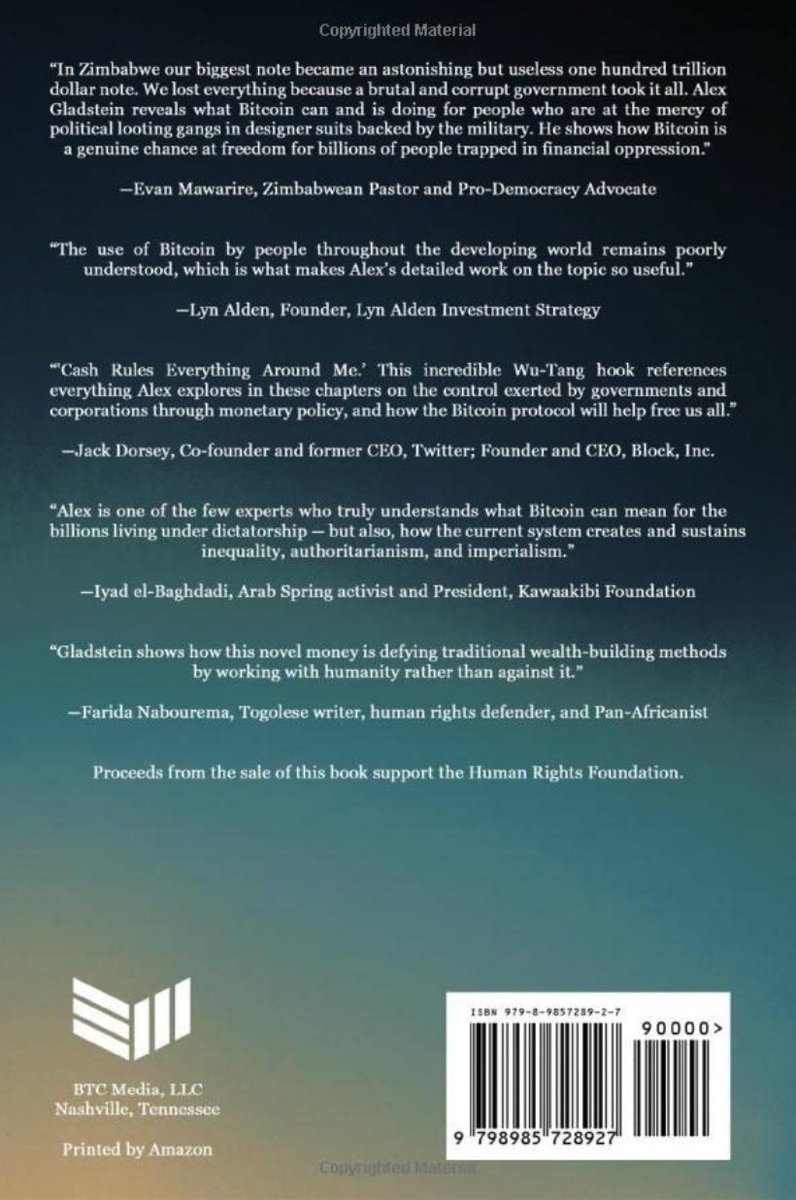
1/ I'm thrilled to announce the publication of my new book:
CHECK YOUR FINANCIAL PRIVILEGE
It's a collection of two years of reporting on financial repression, monetary history, and global Bitcoin adoption.
Pick up a copy today:
amazon.com/dp/B09V2NM9VJ

CHECK YOUR FINANCIAL PRIVILEGE
It's a collection of two years of reporting on financial repression, monetary history, and global Bitcoin adoption.
Pick up a copy today:
amazon.com/dp/B09V2NM9VJ


2/ Part of the proceeds go to support @HRF and Bitcoin development across the planet.
I'd like to share the preface here, and hope that people worldwide find the book helpful in trying understanding the relationship between money and human rights.
Here we go!
I'd like to share the preface here, and hope that people worldwide find the book helpful in trying understanding the relationship between money and human rights.
Here we go!
3/ Nearly everyone has heard about Bitcoin, but only a tiny few are aware of the deep impact the digital currency is having around the world.
4/ From Sudan to Palestine, from Belarus to Nigeria, and from the Congo to Cuba, tens of millions of people are currently using Bitcoin to escape from broken financial systems and lay the foundation for a brighter future for their families and communities.
5/ But as we enter 2022, it is still apparent that the mainstream media and political discourse does not understand or even acknowledge this phenomenon.
Why?
Because they are blinded by their monetary and financial privilege.
Why?
Because they are blinded by their monetary and financial privilege.
6/ Some people are advantaged over others because of the kind of monetary and financial system they are born into.
In social justice parlance, “checking one’s privilege” means to accept that not everyone is born equal...
In social justice parlance, “checking one’s privilege” means to accept that not everyone is born equal...
7/ ... and that one must look beyond their own bubble to empathize with the wider world around them.
This book explores what happens when we check our financial privilege: we start to see what lies beneath and beyond, we realize how well we have it compared to others...
This book explores what happens when we check our financial privilege: we start to see what lies beneath and beyond, we realize how well we have it compared to others...
8/ ... and we start to understand how the whole system truly works.
So who has financial privilege?
Americans, for starters.
So who has financial privilege?
Americans, for starters.
9/ We make up just 4% of the world population, but have financial privilege over everyone else on earth as we enjoy the benefits of the dollar: the world’s most dominant currency, which rules as a central bank reserve, means of trade, and unit of global account.
10/ Beyond the United States of America, anyone who is born into a reserve currency like the euro, yen, or pound also has financial privilege over the 89% of the world population born into weaker systems.
11/ It’s all relative. Americans might have financial privilege over South Africans, but South Africans have enormous financial privilege over Zimbabweans.
The French continue to enjoy financial privilege over their former colonies in Africa.
The French continue to enjoy financial privilege over their former colonies in Africa.
12/ Israelis enjoy financial privilege over Palestinians. The Cuban dictatorship enjoys financial privilege over Cuban citizens.
Going back decades, the ruling elite in America have enjoyed financial privilege over African Americans and Native Americans.
Going back decades, the ruling elite in America have enjoyed financial privilege over African Americans and Native Americans.
13/ You, dear reader, likely enjoy financial privilege over your fellow global citizens living in places like Afghanistan, Sudan, and Iran, which are sanctioned by the powers that be and cut off from the world banking system because of crimes their rulers committed.
14/ Financial privilege is embedded in our world, and has steered the course of history.
It has shifted power from the have-nots to the haves.
It is getting worse.
But guess what?
Bitcoin is going to obliterate financial privilege.
It has shifted power from the have-nots to the haves.
It is getting worse.
But guess what?
Bitcoin is going to obliterate financial privilege.
15/ This new currency creates a level playing field where everyone is considered equal in the eyes of the protocol, no matter whether you live in Gaza or Tel Aviv, Havana or Miami, Dakar or Paris, Washington or Caracas.
16/ The Bitcoin protocol does not care about your level of wealth, color of your skin, beliefs, family history, religion, or nationality.
It is neutral and cannot discriminate.
It is neutral and cannot discriminate.
17/ This book is a collection of writing done throughout 2020 and 2021 as I explored the global impact of Bitcoin, and tried to report on what financial privilege too often obscures.
18/ @BitcoinMagazine gave me the space to write these pages that aim to contextualize Bitcoin adoption alongside economic and political history.
19/ These chapters cover the personal stories of Bitcoin users in Nigeria, Sudan, and Ethiopia; Bitcoin’s pre-history and the cypherpunk movement; Bitcoin in comparison to the negative externalities of the dollar system; Bitcoin’s Trojan Horse mechanism of adoption...
20/ Bitcoin’s rising use in El Salvador, Togo, Senegal, Cuba, Palestine, and Afghanistan; Bitcoin as an antidote to monetary colonialism; Bitcoin’s humanitarian and environmental impact; Bitcoin as an American ideal; and, finally, Bitcoin as a potential new world reserve currency
21/ In the process of writing this book, I have learned an enormous amount about the power of money, and how, sadly, it is used as a tool of control and repression around the world.
I have also learned that Bitcoin provides hope for a freer future ✌️
I have also learned that Bitcoin provides hope for a freer future ✌️
• • •
Missing some Tweet in this thread? You can try to
force a refresh



